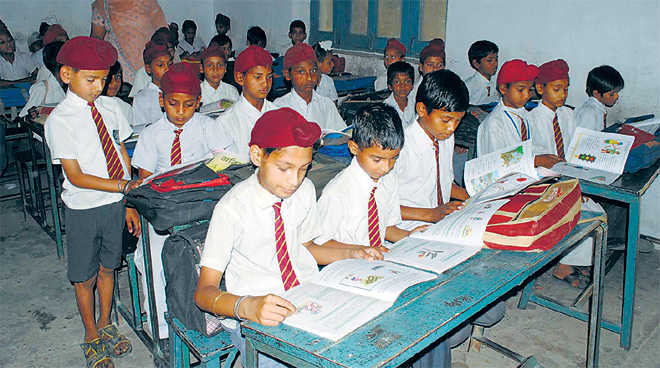
Learning time: Children are inherently intelligent, curious and love to learn. Tribune photo: Rajesh Sachar
Sheshagiri KM
Education Specialist, UNICEF, Chhattisgarh
For a long time, a large number of teachers, parents, bureaucrats, politicians and others have been disgruntled with what they think is the biggest weakness of the Right to Education Act of 2009 — the state's commitment that no child will be detained till grade VIII (elementary level education, that is). The state will not fail the child, whatever the reason may be. This is enshrined in Clause 16 of Chapter IV of the Act. No child shall be held back in any class or expelled from school till the completion of elementary education. When the Act was passed by Parliament, the belief was that the child's circumstances, more than the child, are responsible for lack of learning at school.
Class V exams come with detentions
This commitment will soon be withdrawn if the government of the day has its way. On the anvil is an amendment to the Act which proposes that from grade V, there will be exams. If the child fails, (and there can be a number of reasons for failure), the practice of detention will kick in. The benevolent state will give the child another chance to pass, with additional coaching. I wonder how additional coaching will be provided, when the coaching itself is not up to the mark. May be they will doctor this and then show that the child has passed. After all, every teacher has to look good in the eyes of the parents and the state. If additional coaching doesn't work, the state will give up and declare the child as failed. What happens then? May be grade repetition will somehow magically make the child learn.
This is what many people want. The child has to be failed, only then he or she will learn, they say. Fear (of failure, of the teacher) is the only way out, they say. The outlandish observation made is that learning levels in children have alarmingly dipped following the passing of the RTE Act in 2009.
Nothing can be further from the truth. There is no evidence to substantiate the claim that children were learning better when detention was in place. Our learning outcomes in schools have remained poor for a very long time. There are other more fundamental reasons for this sorry state of affairs.
In August, the Union Cabinet provided its assent for detention to be made a part of the Act. A recent NCERT survey shows that all states, barring Maharashtra, Goa, Karnataka, Telangana and Sikkim, want the no-detention rule to be scrapped. If the Delhi government is to be believed, children will become 'unreasonable, undisciplined and will drop out of school' as a result of no-detention.
In these machinations, the underlying thought is that the burden of non-learning rests with the child. Why should the burden of no-learning or poor learning be on the child alone? Is the state keen on washing its hands off this very important right of every child — the right to education?
What happens in class
In Chhattisgarh, there is a mobile application which monitors, in real time, the attendance of both children and teachers in elementary schools. Teachers, parents, government officials, a few elected representatives all report on this app. There are a little more than 20,000 users (admittedly, a small number), but not all of them report regularly. Still, it is interesting to see the data. Over the past several months, children's attendance has averaged 70 per cent, and teacher attendance, is mid-70 per cent, with district-wide variations. It is clear that both children and teachers are not regular in going to school. Little wonder that children don't learn.
The nature of what happens inside the classroom is fundamental to learning. The term 'time on task' (TOT) is used to find out how much of 'learning time' the child gets in the six hours or so s/he spends at school. Studies have shown that we are heavily wanting on TOT —most of the time is spent on giving instructions ('do this and do that') and all children end up doing more or less the same things. Little time is spent on discussion, exploration and expression, with the result that there is very little understanding. TOT studies actually tell us that there is very little time spent on 'active learning', involving application and resulting in understanding.
The burden of non-learning is thus linked to the burden of non-teaching or teaching that does not make any real difference, which is further linked to the ways in which teachers are prepared, monitored and supported. It is the state which is found wanting here, not the child.
For communities and families facing severe social and economic pressures, participation in school becomes the first casualty. How is the child to be blamed for these circumstances? Much work remains to be done by the welfare state. That is the reason why the RTE Act holds the state accountable.
In the classic How Children Fail, John Holt observes that children are inherently intelligent, curious and love to learn, provided there is an enabling environment to do so. Instead of bringing a draconian amendment to the Right to Education Act, the state should first go about setting schools right. Learning will then happen.
When a child is detained
Branding a child as a failure will have a debilitating effect on her self-esteem. It can scar him/her for life.
Year after year, many young lives, especially in urban settings, are snuffed out because the child who faces difficulties just does not get the emotional and academic support that she so desperately needs.
There is no evidence to substantiate the claim that children were learning better when detention was in place.



























